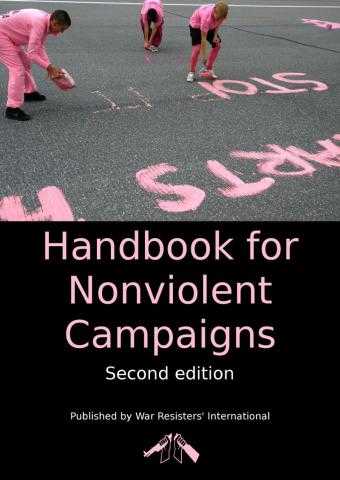WRI's Nonviolence Programme promotes the use of active nonviolence to confront the causes of war and militarism. We develop resources (such as the Handbook for Nonviolent Campaigns) and provide nonviolence training to groups seeking to develop their skills.
WRI's Nonviolence Programme:
-
empowers grassroot activists in nonviolent campaigns, through resources, publications and by leading training in nonviolence;
-
coordinates regional nonviolence trainers' networks;
-
educates the WRI and wider network of the connections between economics and war.
We believe the goals of peace and justice will eventually be achieved through the persistent work of grassroots movements over time, in all countries and regions. Our mission is to support these movements, helping them gain and maintain the strength needed for the journey they face, and to link them to one another, forming a global network working in solidarity, sharing experiences, countering war and injustice at all levels.
Resources
Handbook for Nonviolent Campaigns
In 2014 we published the second edition of our Handbook for Nonviolent Campaigns, a book to accompany and support social change movements. The book – written by over 30 seasoned activists - has been translated into over ten languages, and several thousand copies have been sold. A wide variety of movements, campaigns, trainers and individual activists from around the world have made use of the Handbook.
The English and Spanish version of the Handbook can be bought from the WRI webshop.
The German version of the Handbook is published and sold by Graswurzelrevolution.
For information other editions/languages, please contact us at info@wri-irg.org.
Empowering Nonviolence
From April 2017, the Handbook – and lots of other content – will be available online on our new Empowering Nonviolence website. Empowering Nonviolence allows users to browse the content of the Handbook, helping to make activists and movements more effective in their campaigning and direct action, more strategic in their planning, and to become more sustainable, as they learn from others and share stories and ideas.
New Worlds in Old Shells
When we think of nonviolent social change we often think of protests, direct action, banners, placards, and crowds in the street. Often these actions are saying “No!”, resisting the causes of violence and war, and they are very necessary. As important though, are the communities and organisations “building a new world in the shell of the old”, saying “yes!” by putting into practise the emancipatory, nonviolent, empowering ways of working and living we hope – one day – everyone will experience. Gandhi coined the word “constructive programmes” to describe this sort of social change, and we are currently writing a new publication exploring these ideas, called New Worlds in Old Shells.
Nonviolence Training
The Nonviolence Programme is a direct response to needs expressed by activist groups for nonviolence training and resources, especially focusing on campaign strategies for nonviolent direct action (NVDA). The training tools and materials we use are designed to facilitate the groups that contact us in the processes they initiate and lead. We do not prescribe a particular way of taking action; our goal is to train and empower local nonviolence trainers, to build independent, local capacity with the groups we work alongside.

